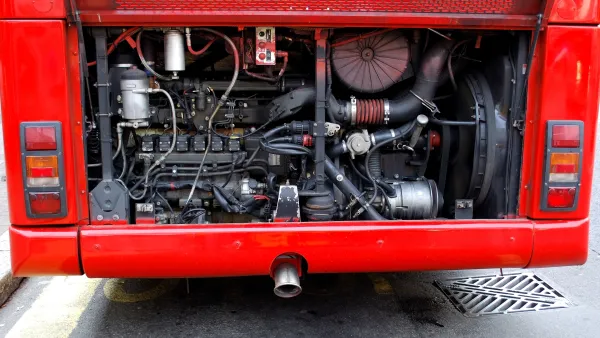Three whammy’s are pressing America’s luck this spring as the nation engages in one of the most exciting presidential elections in my lifetime. The problem is that the only solution that has been proposed at the national-level has been a gas tax holiday. A gas tax holiday would have the effect of starving our increasingly troubled transportation system of the necessary funds to maintain and improve infrastructure and service.
Three whammy's are pressing America's luck this spring as the nation engages in one of the most exciting presidential elections in my lifetime. The problem is that the only solution that has been proposed at the national-level has been a gas tax holiday. A gas tax holiday would have the effect of starving our increasingly troubled transportation system of the necessary funds to maintain and improve infrastructure and service.
I would love to see a presidential debate about the future of transportation in America. This debate would address the three whammy's facing transportation in America:
Whammy # 1 – Rising fuel costs
Rising fuel may come as a shock to Americans but some have seen this day coming for a half century. In 1956, Dr. Hubbard, a geologist for Shell, predicted that American oil would peak in 1970. Dr. Hubbard was correct. He also predicted that global oil production would peak around the year 2000. Due to the oil shock in the late 1970s, which resulted in less fuel consumption, the peak was delayed by nearly a decade. It appears that Dr. Hubbard may be correct a second time.
The problem is that America is ill prepared to leave our vehicles at home. Most suburbs and towns have been designed with low-density land uses, which do not support public transit, walking, or bicycling. Despite this, American's are using transit in record numbers. Park-and-rides are overflowing and buses and trains are full.
Whammy # 2 – Transit agencies cannot afford fuel
Across America, transit agencies have to cut service at a time when we need transit more than ever before. This is because the cost of fuel is outpacing farebox revenues. This insult to injury hurts working class Americans the most. In recent weeks Miami and Denver announced major service cuts to their transit system. Unfortunately, more transit systems are sure to follow unless the federal government steps in and provides some financial relief.
Whammy # 3 – Gas and sales tax revenues are down
A major source for funding transportation service and infrastructure comes from gas and sales taxes. The federal government, as well as many state governments, collect gas taxes to fund transportation capital improvements. Many cities use a sales tax to fund transit operations. As increased fuel prices pinch our economy, people spend less, thus resulting in fewer gas and sales tax revenues to support our transportation system.
These three whammy's are resulting in a downward economic spiral that needs presidential attention.
The problem with America is that we have lost our vision. The post-WWII generation, emerging from turbulent times, had high hopes for a better future. This future focused on how transportation and new development patterns could improve the lives of the average working class American. The outward expansion of highways and suburbs of the 1950s, '60s and '70s provided mobility for a growing economy.
Fifty years later, we once again need a national hope for how transportation and new development patterns can improve our lives. This time the hope is for creating a balanced, multimodal transportation system with cities designed for walking, bicycling, and public transit. Our hope for the 21st century is to reuse what we have overlooked. We need to embrace a new green economy that creates solutions beyond fossil fuels. The green economy of the 21st century will be based on using our resources better and minizing waste.
Unfortunately, none of this is possible without money and a vision. Rather than discussing how a gas tax holiday can help America for a few months this summer, we need our presidential candidates to begin a real discussion about how our country can create a sustainable transport system for the 21st century.


Analysis: Cybertruck Fatality Rate Far Exceeds That of Ford Pinto
The Tesla Cybertruck was recalled seven times last year.

National Parks Layoffs Will Cause Communities to Lose Billions
Thousands of essential park workers were laid off this week, just before the busy spring break season.

Retro-silient?: America’s First “Eco-burb,” The Woodlands Turns 50
A master-planned community north of Houston offers lessons on green infrastructure and resilient design, but falls short of its founder’s lofty affordability and walkability goals.

Test News Post 1
This is a summary

Analysis: Cybertruck Fatality Rate Far Exceeds That of Ford Pinto
The Tesla Cybertruck was recalled seven times last year.

Test News Headline 46
Test for the image on the front page.
Urban Design for Planners 1: Software Tools
This six-course series explores essential urban design concepts using open source software and equips planners with the tools they need to participate fully in the urban design process.
Planning for Universal Design
Learn the tools for implementing Universal Design in planning regulations.
EMC Planning Group, Inc.
Planetizen
Planetizen
Mpact (formerly Rail~Volution)
Great Falls Development Authority, Inc.
HUDs Office of Policy Development and Research
NYU Wagner Graduate School of Public Service



























